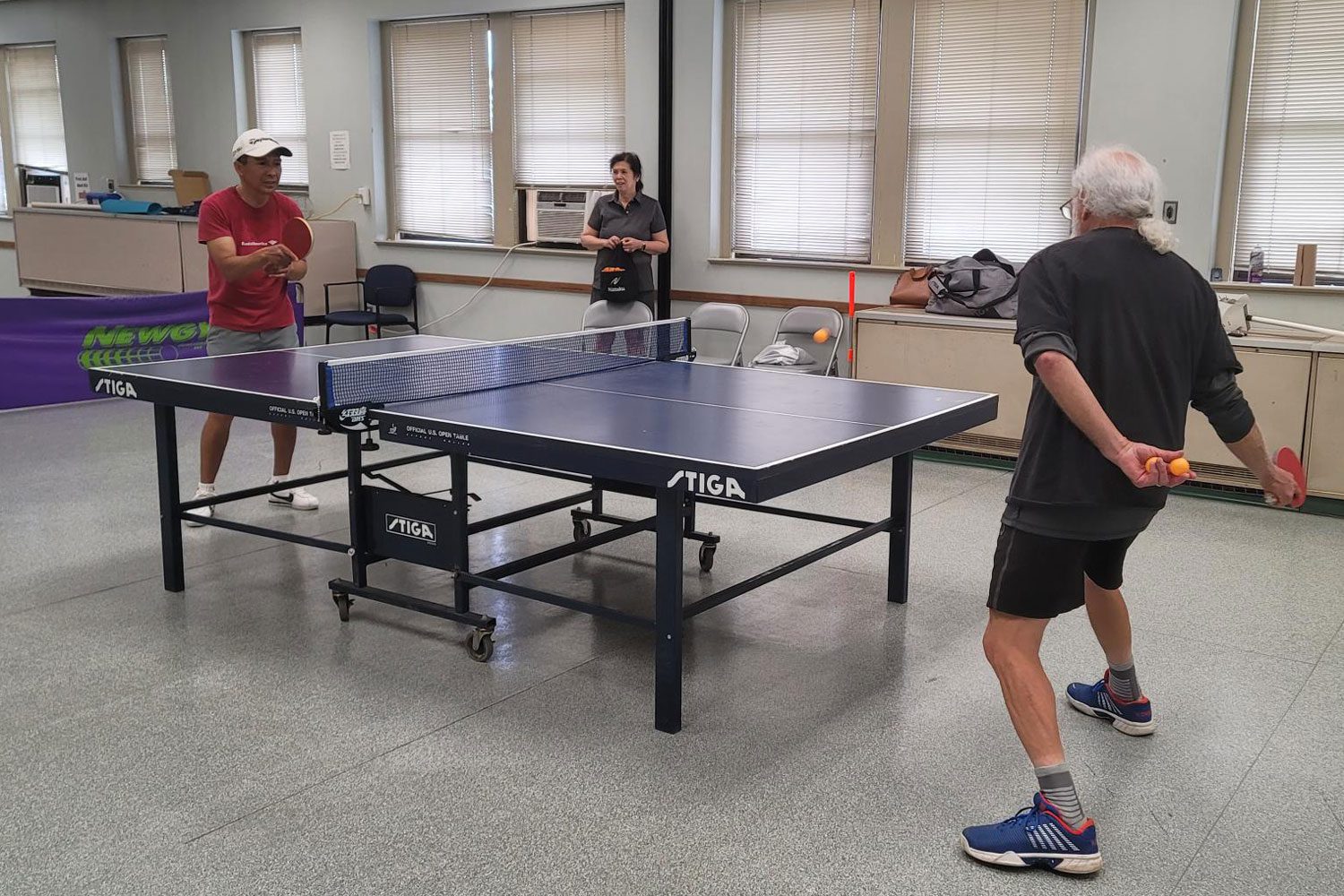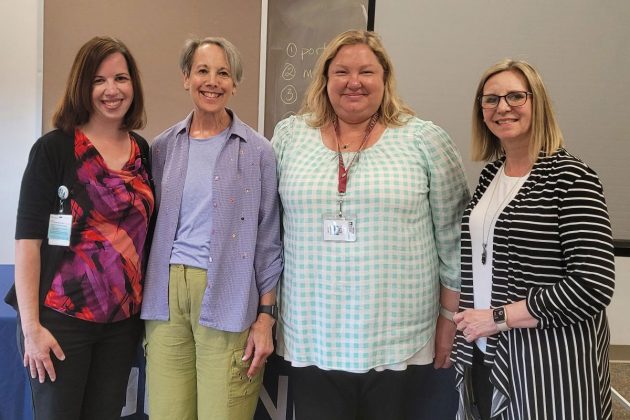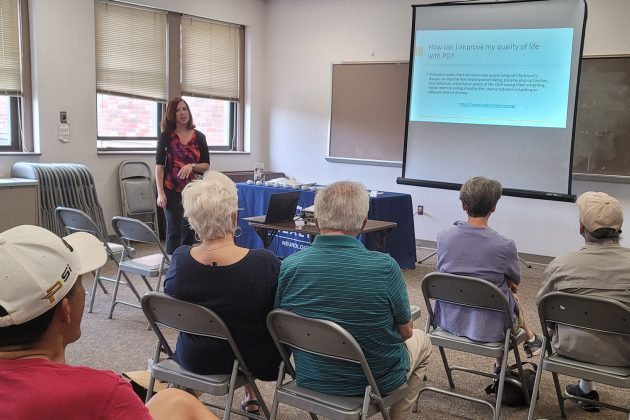UConn Health Patient Starts ‘Parkie Pong’ in West Hartford

Audio By Carbonatix

Jorelito Terencio (left) and David Frankel are among the volunteers who play ping pong with people with Parkinson's disease as part of the West Hartford Senior Centers' Parkie Pong program at the Elmwood Senior Center. Photo by Karen Mendoza.
Ping pong shown to benefit motor function; social work, as a component of Parkinson’s disease care, emphasizes importance of socialization and community resources.
By Chris DeFrancesco, UConn Health
A typical week for Laini Weitz includes pickleball, running, hitting a heavy bag, cycling, and lifting weights.
Already an avid exerciser, the 72-year-old West Hartford resident didn’t need much convincing that staying physically active would become even more important when she learned in early 2022 that she had Parkinson’s disease.
“It wasn’t a big change for me to say, ‘OK, now I have to exercise,’ except I’m probably now more maniacal about it,” Weitz says.
But then a knee injury limited her options.
“I tore my meniscus, and I was out of pickleball for four months. You can’t do that to me,” Weitz says. “So I said I need something else. Well, ping pong doesn’t have the same demands, so maybe I’ll play ping pong.”
She played ping pong in college, and occasionally had been playing with her grandchildren. But when figuring out how to make it part of her exercise routine while sidelined with the knee injury, she learned of ping pong’s emergence as an effective way to help people with Parkinson’s disease maintain their function, and in some cases, regain some of the function that was lost.
“And the more I looked at it, the more I found all sorts of literature about how this is great for cognition and for spatial relationships, and for socialization and for strategy, and for movement and for gait, it just kept adding on and on,” Weitz says. “And it wasn’t just people talking, it was doctors who were saying this.”
In time she would bring the idea to her local senior center, where it would become both a recreational activity and a form of physical therapy to help those with Parkinson’s maintain their dexterity and motor skills.
Not long after her diagnosis, Weitz started working with Kristen Vavrek, a social worker in UConn Health’s neurology practice who works with patients in the Parkinson’s Disease and Movement Disorders Center.
“I think for me a lot of the adjustment is psychological, coming to terms with what this diagnosis means in the present and the future, sharing the diagnosis with my husband, and us working together as a team,” Weitz says. “Physically it wasn’t a whole lot because my symptoms are still relatively mild and I’m not on medication.”
Vavrek runs two Parkinson’s support groups, one for patients and another for caregivers. At a meeting earlier this year, Weitz presented to the group about how those with Parkinson’s disease could benefit from playing ping pong.
By then an idea already had formed to bring “Parkie Pong” to the Elmwood Senior Center, which has four ping pong tables at its Elmwood Community Center location.
“Would this be a crazy idea?” Weitz remembers thinking. “And so I did a lot of research on numbers, sent a proposal to Lisa Hanse at the West Hartford Senior Centers. I said, ‘Parkie Pong, why not? You used to have a program for Parkinson’s but not ping pong, and during COVID that got disbanded, maybe it’s time to do something again.’ And they said, ‘We love it!’”
“Our movement disorders team worked collaboratively with Laini and the West Hartford Senior Centers in support of a Parkie Pong program there,” Vavrek says.
Volunteer ping pong players join those with Parkinson’s disease at the senior center for regularly scheduled games, by hitting balls back from the other end of the table or simply by picking up the ball for the players.
“It’s a safe place to play, and to get some exercise and to socialize, and to know that you’re accepted,” Weitz says. “It’s a place where you can open up and maybe shed some of the anxiety or some of the depression that comes along with it because you’re having fun. You’re doing something that’s good for you in a fun and supportive environment.”
The concept has grown in recent years. The nonprofit PingPongParkinson was established in Westchester County, New York, in 2017 by Nenad Bach. Bach was a musician whose Parkinson’s disease hindered his ability to play guitar. He noticed improvement after using ping pong as a form of physical therapy and was able to go back to playing guitar after about six months. The idea has spread to several other states and there’s a chapter in Austria.
A kickoff event was held June 14 for the Parkie Pong program at the Elmwood Senior Center in West Hartford. The organizers asked Vavrek to be the keynote speaker.

From right: Lisa Hanse, Rebecca Sears, and Laini Weitz are the organizers of the West Hartford Senior Centers’ Parkie Pong program, where those with Parkinson’s disease can use ping pong as a form of physical therapy. They invited UConn Health social worker Kristen Vavrek (left) for the program’s kickoff June 14, 2023. Photo by Karen Mendoza
“I just have a ton of respect for Kristen and everything she does,” Weitz says. “I think she has a beautiful way of relating to people. She’s empathetic and caring, and friendly and knowledgeable, and I thought she would just be a great person to kick off our program.”
To take part in or learn more about the Parkie Pong program, which is free and open to those with Parkinson’s disease and their support partners, call 860-561-8180 or email [email protected].
“Social work is a systems framework as to how we focus on care, and Laini connected herself to her community, which is exactly what we hope to see in our patients,” Vavrek says. “As she was adjusting emotionally and psychologically to the news of her Parkinson’s disease diagnosis, she looked for ways to continue to help herself and in doing so, she found ping pong as an outlet. The more that she learned and researched about the benefits of ping pong with Parkinson’s disease, she was able to shift her focus on helping others and her community.”
Every 6 minutes
An estimated 90,000 Americans will be newly diagnosed with Parkinson’s disease this year. It works out to a new diagnosis for someone – and with it, an understandable cascade of emotions – about every six minutes.
It’s why social work is an integral part of care at UConn Health’s Parkinson’s Disease and Movement Disorders Center.
“It’s not just about the disease, it’s also about how they feel about the disease and what’s going on for them, looking at the impact of what’s being said to them and who their support network is,” Vavrek says. “A lot of conversations that I have are the conversations we have in our heads, but not necessarily the conversations that we have in the open with people. And I’ve had a lot of patients tell me that can be really lonely. So I encourage open dialogue, and I’ll say to people, ‘I’m starting the conversation with you and your loved ones here today, and I encourage them to continue this conversation at home.’”
That can include the often daunting conversation about long-term plans such as advanced directives.
“We don’t know what’s going to happen, but if we can do a little bit of planning today, that’s going to help alleviate some of the anxiety and those fears of what is to come in the future,” Vavrek says. “These diagnoses don’t just affect the person with the diagnosis.”
At the time of diagnosis and shortly afterward, one goal is to help patients identify and build their support network. The discussions reinforce the benefits of socialization in the community, whether extended family, fellow support group members, a senior center, a church, or an exercise group.
“Apathy is something that is really significant in Parkinson’s disease,” Vavrek says. “The mood component to Parkinson’s disease, which is a non-motor symptom, is your apathy, depression, and anxiety. In my role as a social worker, I help patients identify signs of apathy and ways to manage their mood symptoms to enhance their quality of life and not let the disease control them.”
Licensed clinical social workers hold master’s degrees and are trained to help people navigate challenges in their lives. In a health care setting, they help both patients and their families manage changes brought about by illness or injury by providing counseling and connecting them with resources.
“We feel lucky to have two wonderful licensed clinical social workers in our department,” says Dr. Bernardo Rodrigues, UConn Health neurologist and director of the Parkinson’s Disease and Movement Disorders Center. “We often work with patients and families living with progressive, debilitating, neurodegenerative conditions that can affect quality of life and independence. Having social workers in our clinic has helped patients and families cope with such a big challenge, and transformed the care that we provide.”

UConn Health Social Worker Kristen Vavrek gives a presentation at the Elmwood Senior Center about managing Parkinson’s disease. Photo by Karen Mendoza
Learn more about the Parkinson’s Disease and Movement Disorders Center at UConn Health.
Learn more about the Parkinson’s disease patient support group at UConn Health.
To learn more about the Parkinson’s disease caregiver support group at UConn Health, email [email protected] or call 860-679-3224.
This article originally appeared in UConn Today. Republished with permission.
Like what you see here? Click here to subscribe to We-Ha’s newsletter so you’ll always be in the know about what’s happening in West Hartford! Click the blue button below to become a supporter of We-Ha.com and our efforts to continue producing quality journalism.



